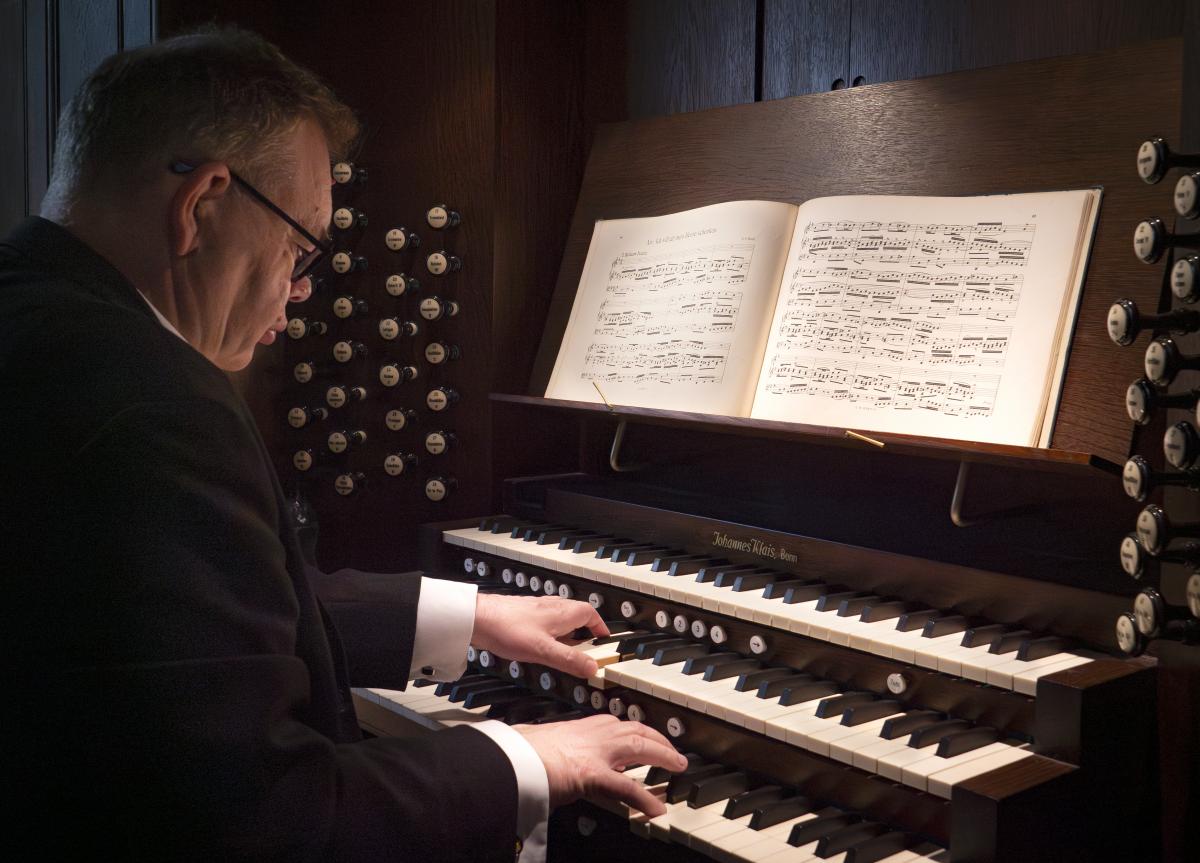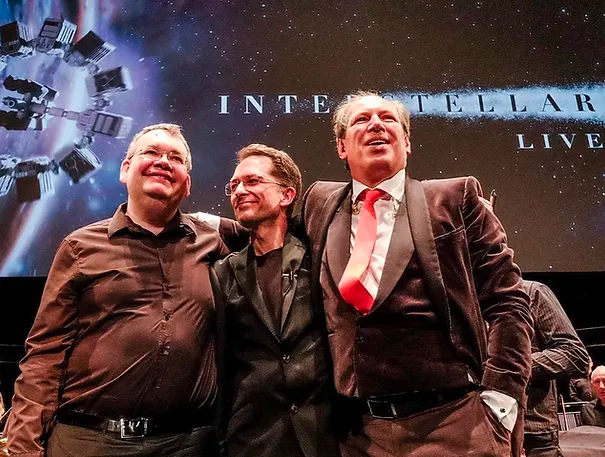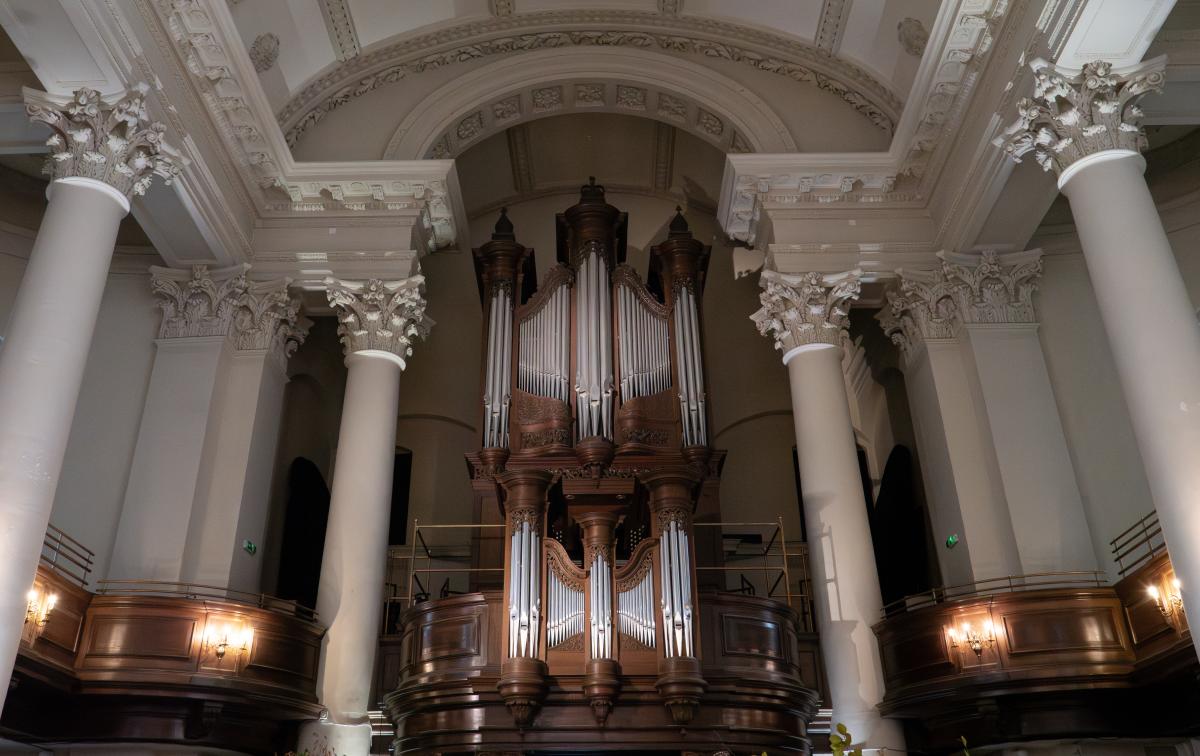An acclaimed organist and choral director, Roger Sayer is known for his versatility. Praised by film score composer Hans Zimmer for his “impeccable artistry”, Roger’s career has seen many highlights.
The winner of the St Albans International Organ Competition in 1989, his work has seen him perform as the organ soloist on the film soundtrack for Interstellar, give a live recital at Temple Church for the BBC, and become the first British organist to record the complete sonatas of Josef Rheinberger.
His other career highlights include founding the Rochester Cathedral Girls’ Choir and working as the accompanist and Deputy Chorus Director for the London Symphony Chorus.
Roger has recently been appointed Organist in Residence at St John’s Smith Square. Ahead of his concert in the hall on 20 January, we talk to him about his inspiration, working with Hans Zimmer, and favourite organ pieces.

When did your love of the organ begin?
My grandfather was a self-taught organist, and I used to sit by him when he played in his village church. I was always curious about the organ: this big instrument high up on the wall with its grand pipes.
I liked its power, its volume, and I decided I want to become an organist. I started off learning the piano, and I eventually took organ lessons at the age of 11 when my feet could reach the pedals.
The organ is a complex instrument to play – depending on the piece, there can be three or four staves read, and you have to learn how to use your feet independently from your hands.
No one organ is the same, which can be challenging! You can learn a piece of music, but you don’t necessarily know how it is going to sound on the organ you will be playing. Some are mechanical, some are electric; the instruments can have a different number of pedals and keyboards – ranging from two to five – and sometimes the pipes aren’t connected to where the console is, which results in a delay.
While I practice on a little organ at home (which doesn’t have any pipes), I find there’s no musical reward until you go and try and make music on the organ that you’re going to play.
You’re the organist on Hans Zimmer’s soundtrack to Interstellar – an award-winning science fiction film released in 2014. What was the experience like?
It was a very rewarding and creative experience. Hans Zimmer had always wanted to write the organ into one of his scores, and because this film is about an afterlife, a new world – there’s a connection to religion in a way – he was keen to feature a live organ.
Although Zimmer provided the score, the whole exercise of recording the soundtrack was about finding ways to interpret the sounds that he had in mind. The process took five days at Temple Church in the City of London. The beauty of the Temple organ is that it’s absolutely full of colour, so it’s an excellent instrument for this sort of thing: it has beauty, gentleness, and power.
All of the various instrumental parts had been recorded separately, so the tempo was set with a click track, to ensure everything could be combined. That was a challenge, to be musical and to try and find a lovely sound, whilst being restricted and restrained by an unforgiving pulse!
The Interstellar soundtrack features six organ parts, which we recorded individually. However, when we were asked to play the film score live at the Royal Albert Hall, I had to take the score and condense as much of the important thematic information into a single part. This is the score that I will play at St John’s Smith Square on 20 January.

What’s your favourite musical passage to play on the organ?
Each day you ask me this question, I might come up with a different answer! You can’t beat Bach. Every time I play his pieces, I see and hear new things.
I recently played Bach’s Prelude in C minor (BWV546), and I thought to myself at the end of that: “this has to be one of the best pieces of music ever written.” However, there are hundreds of other Bach pieces you could attach this comment to!
If there was one piece that I wanted to play, and would never play another piece again, I think it would be Bach’s Prelude and Fugue in B Minor.
What are the hidden gems of the organ repertoire?
There is a lot of organ music out there. There are some wonderful German Romantic composers who wrote for the organ in a symphonic way, using the instrument like an orchestra: full of colour, full of fire with rapid changes in dynamics.
One of my favourites is Sigfrid Karg-Elert. He was a very creative man who wrote orchestral music and songs, but his work has been overshadowed by other composers of the time. His setting of Jesu, meine Freude is exquisite, but hardly anyone knows about it.
What’s it like to play on St John’s Smith Square’s organ?
St John’s Smith Square’s organ is well known in the organ world. It’s wonderful: it’s visceral, expressive, speaks directly into the building and is responsive to the touch, which is what a good organ should be.
You’ve got to be at the top of your game to play well here, because the sound it makes is very clear. It’s a treasure and a pleasure to play.


